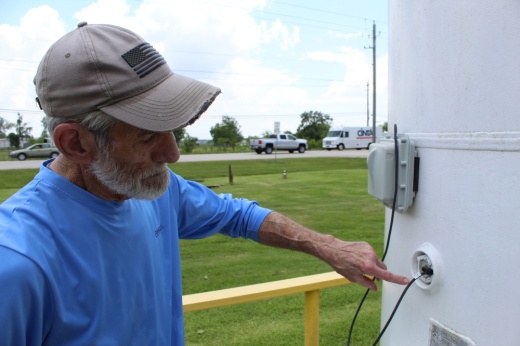Mike Travis, an employee of Gas Products Unlimited in Pearland, witnessed the surge in demand firsthand. Travis said he sold 500 gallons of propane the morning of July 9, but ran out of propane to sell before noon, after opening the business at 9 a.m.
The big picture
Ed Hirs, an energy consultant, and a lecturer and Energy Fellow at the University of Houston, said two main factors played a role in long lines at gas stations, both of which he said are common in the aftermath of a hurricane.
The first is the loss of electricity, forcing gas stations to shut down if they don't have a backup generator. The second are the interruptions in the gasoline distribution network as roads become impassable, and truck drivers and other employees need to tend to their families after the storm.
Zooming in
As Beryl defied initial projections for its track, veering north toward Houston in the days before it hit, there was an extra push on the demand side, Hirs said, as people drew down gasoline supplies before the storm.
Demand for gasoline was further intensified by the power outages in that people without power sought gasoline to fuel their generators, Hirs said. Although most people weren't driving due to dangerous road conditions, many people without power were likely using their vehicles to power air conditioning units to stay cool as well, he said.
However, Hirs said Beryl was not as destructive in terms of the effects it had on the infrastructure at the refineries and distribution sites. Other storms to hit the Gulf Coast in the recent past have lifted entire tanks off their moorings, he said.
"It’s going to be a relatively simple matter of getting the fuel supply chain reinstated," Hirs said. "The major oil companies, the major refineries have [staff] from their other locations around the country who are ready to come in and help staff a refinery or distribution facility here because the workers are at home taking care of their own problems."
The takeaway
Regular gas prices in the Houston area were around $3.16 per gallon July 11, according to AAA, up from $3.07 one week ago and $3.01 one month ago.
Hirs said he expects any gasoline price increases caused by Beryl to be short-lived.
"It really is going to happen just due to the rerouting of tankers and the fact that companies are paying for employees to come in ... to literally man the pumps," he said. "Thankfully, I have not heard of any of the refineries taking a hit, other than the interruptions to service flaring along the coast at a bunch of places, but I think that’s really due to the temporary interruption of business."
Moving forward
Efforts to mitigate gasoline shortages in future storms are tied in part to making above-ground electricity distribution facilities more resilient, Hirs said. Hirs, who has been warning about Houston's electricity grid since 2015, said Texas has been underinvesting in its grid for decades.
"Florida has taken the initiative with legislation requiring stronger, more resilient electricity distribution facilities, and Texas is lagging behind," he said. "It’s a matter of economics. You get what you pay for, and if you don’t pay for resilience and reliability, you’re not going to get it."
Hirs said the grid needs to be hardened to specific weather engineering standards for electricity poles, wires and connections, and that more work needs to be done to prevent trees to damaging lines. After Winter Storm Uri caused widespread power outages in February 2021, ultimately resulting in 246 deaths, the Texas Legislature called for grid hardening measures but did not provide enough specifics to make those calls meaningful, Hirs said
"This is going to have to be led by the public calling up the representatives and state senators and getting them to do something useful," he said. "We either get to work on it or we continue to pay for it with unreliable service and piecemeal rebuilding time and again."
In the meantime, CenterPoint officials have not released officials timelines for restoration, and are directing people to a new tracker map for updates.
Rachel Leland contributed to this report.





